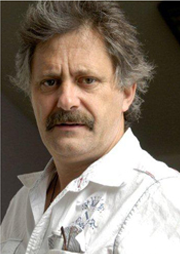Research Line: La inflamación en la angiogénesis, la migración celular y la metástasis. Universidad de Chile | e-mail aquest@accdis.cl
Andrew Quest received a Masters degree (1983) and a Ph.D. degree (1988) in Biochemistry from the Swiss Federal Institute of Technology, Zuerich. He then trained as a post-doctoral fellow with Dr. Ben Shapiro (Department of Biochemistry, University of Washington, Seattle, WA, USA) studying lipid modifications of proteins (1988-1990) and then with Dr. Robert M. Bell (Department of Biochemistry, Duke University, Durham, NC, USA)investigating lipid-dependent regulation of Protein Kinase C (1990-1994).
He then held a position as Assistant Professor at the Institute of Biochemistry, University of Lausanne, Switzerland (1994-1999), where he studied the role of membrane microdomains (rafts, caveolae) in cellular signaling and cancer. He moved to the Institute of Biomedical Sciences (ICBM), University of Chile, Chile (1999 to date). Since then he has been working in the areas outlined under “Research Interests”.
Andrew Quest currently holds a position as Full Professor. Projects in his laboratory are funded by national programs (FONDECYT/FONDAP/PIA). He is one of the six principle investigators that founded the FONDAP Center for Molecular Studies of the Cell (CEMC) in 2002 studying basic cellular mechanisms in physiology and pathology. He is the current Director of CEMC, which continues to pursue similar scientific objectives and foster the training of advanced human resources by providing unique research opportunities for students at all levels (undergraduate, graduate, post-graduate, as well as favorable conditions for the insertion of young academics into the Chilean research system. Additionally, he is director of the Network for Metabolic Stress Signalling (NEMESIS) that evaluates molecular mechanisms underlying the development of chronic diseases in Chile (see website www.nemesis-ring.cl). Finally, he is principle investigator and scientific director (area cancer) of a new FONDAP center called ACCDiS (Advanced Center for Chronic Diseases) with six investigators that study mechanisms leading to the development of cardiovascular diseases and cancer.

